Mold Remediation
If you have mold, you want it cleaned up. The problem is most people do not realize what caused the mold and mold remediations often fail because the cause of the mold is not addressed, and the mold comes back. In addition, the layperson (that is you reading this web page) often does not know the extent of the mold. Case in point you see some mold in your unfinished attic, and you think you have two beams to remediate, in fact 97% of the time you treat the whole attic because mold is present in other areas, just different color mold and not as visible. Trust me if it grows in an attic, you treat the entire space. Mold remediation is the removal of mold for sure, but it should also encompass what caused the mold so that can be addressed as well. Another kicker, if you have mold say on the wood ceiling in an attic, basement or crawlspace, you will also mold proof the space by applying a fungistatic coating to the wood (mold food source). We apply these fungistatic coatings (mold resistant) in these three common areas for mold growth and on new construction for builder who want to mold proof the areas. Granted this is typically on higher end homes or is a specification of the architect designing the house or addition.
The photos below show an attic and a crawlspace, which both had heavy mold growth due to moisture which will never be 100% controllable without spending thousands of dollars on changing infrastructure, so we apply a white tinted fungistatic coating to prevent future growth. Not sexy photos, but neither is mold.
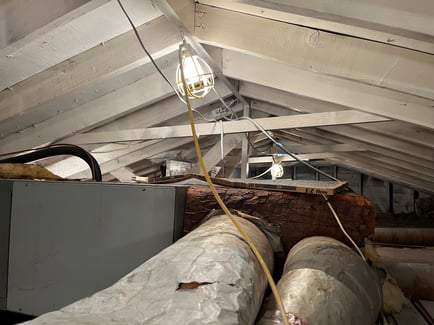
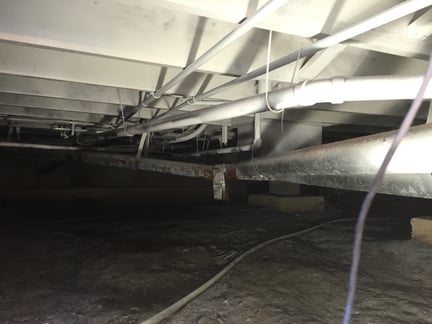
The rub is the fix for preventing mold is typically a service not performed by a mold remediation company. You see all mold is caused by water and controlling water is not remediation it is having good building practices, controlling water and moisture.
You do not want to hear this but for successful mold remediation, you really want to start with a mold inspection.
Thousands of times we have had sites where people see mold, DIY test mold and they want mold remediation. The problem is they do not know the extent or cause. We know this because we will not quote remediation if the mold is not defined. I say this because almost 50% of our mold work is fixing a mold remediation that was not successful.
Mold Inspection & Testing Services
The EPA does not recommend testing mold when mold is visible. Mold testing is not always needed.
That said if you find a find a discolored surface at work, home or when buying a property, most people think mold and you can test this stained area to know 100% if mold is present or not. Yes, we test a lot of services that people think are mold and they are not.
A professional mold inspection can verify if mold is or is not present, what caused the mold and how to address the mold. The rub is only 11 states have mold regulations, so you likely cannot find a licensed company and even harder a qualified mold inspector. Your end product of a mold inspection is a plan to address the mold problem.
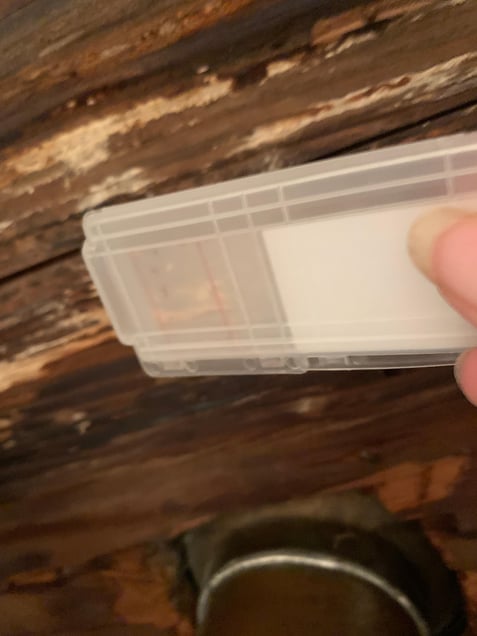
The EPA as well as multiple international health organizations acknowledge that mold is an indoor air contaminant. So any mold indoor can degrade air quality.
Mold when growing (musty odor means mold is actively growing) generates spores which you inhale and will trigger an autoimmune response. One mold spore can range in size from 3 to 40 microns, a human hair is 100 to 150 microns. A square inch of visible mold can contain thousands of spores. 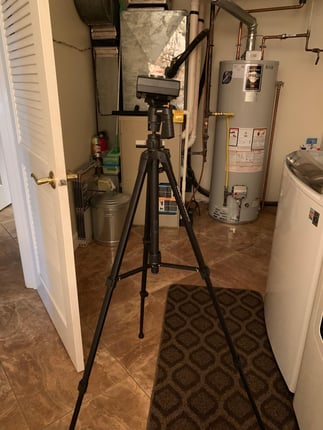
Speak to a Mold Professional 856-858-9509
Think Mold Spores Can Harm You?
When Mold grows it also generates mycotoxins as well as MVOC’s (Microbial Volatile Organic Compounds) producing chemicals such as benzyl cyanide. Both mycotoxins as well as MVOC’s produce toxic metabolites that can be toxic to lung cells and may cause upper respiratory tract issues. In short, when mold grows it produces byproducts as part of the metabolism of organic matter, but it can also break down building materials that can release air pollutants. Think about a rubber tire burning, the fire releases the compounds that comprise the tire, don't want to breathe that, well how about mold breaking down organic matter, glues, paint, and fire retardants, all of which can become airborne when mold breaks matter down.

So inhale mold spores, inhale MVOC & mycotoxins (byproduct of mold growth. Hey if you smell musty odors that is what you are inhaling. This all goes to your lungs. If you do not immediately feel the effects, give it time. Your body will try and fight it.
Visible mold is pretty straightforward, although we get lots of calls to evaluate spotting, staining, discoloration, etc. of a building material inside a home or office. It seems when you are not talking about a bathroom, where mold is highly common people see a fungal-like substance somewhere else inside and want further evaluation.
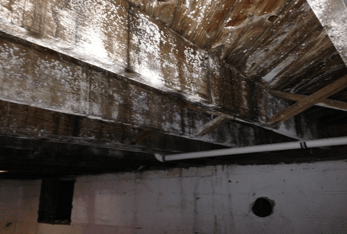
Mold may not be as obvious as you think. Many sites have mold that is present that has been growing off and on for an extended period of time. When mold grows intermittently you typically will not find the musty earthy odor associated with active mold growth
consistently being present in the air. Meaning maybe you have water entry from the rain in say a crawlspace (photo below). Well, every time it rains the crawlspace takes on water and mold grows. So for a few days after the rain, you can smell the musty odor because mold is actively growing. When the water dries out, the mold growth stops and so does the musty odor.
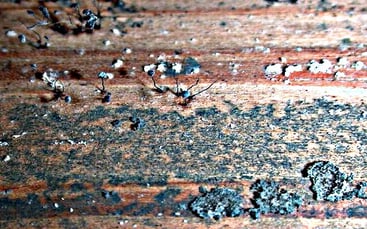
For solid advice on how to prevent mold clink here. mold prevention tips
Where is mold most often found? Attics, basements and crawl spaces are the most common growth areas for mold.
The photo below has mold growth on the wood, but to the casual observer you would think no mold is present, because you don't see heavy staining. But if you looked closely with the appropriate lighting, you would see the growth. Mold inspections are thorough because they look at surfaces that the passing glance would not see.
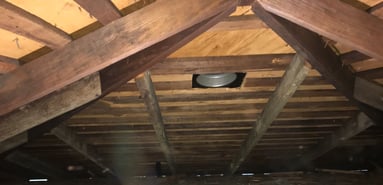
Mold inspections can be prudent in certain circumstances, which include the following:
Selling a Home
Thinking of selling your home? The buyer will hire a home inspector, who may find mold or a mold-like substance. If mold is found Hysteria can ensue. Be proactive and have a mold inspection performed before you list the property for sale. Addressing mold in advance of finding a buyer will save money and buyer hysteria. You may also find that for the mold to have grown, you had a water issue you were not aware of, that would be found during the home inspection.
Think you smell or see Mold?
Do you smell a musty or earthy odor indoors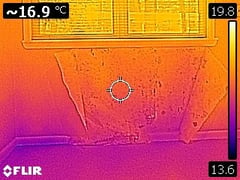 ? Are building materials discolored? As soon as you discover the presence of mold or suspect mold, arrange for a professional mold inspector to evaluate the problem. If you are having a home inspection and your home inspector finds mold, call Curren Environmental. Mold inspections can be visual, and destructive, by testing or IR (infrared)
? Are building materials discolored? As soon as you discover the presence of mold or suspect mold, arrange for a professional mold inspector to evaluate the problem. If you are having a home inspection and your home inspector finds mold, call Curren Environmental. Mold inspections can be visual, and destructive, by testing or IR (infrared)
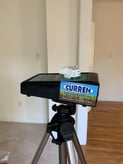
Remodeling your basement?
If you are finishing your basement we recommend having a mold inspection performed. Basements are a common growth area of mold and covering mold over will only increase the eventual cleanup cost. Exposure to mold can cause a number of potential health effects and creates worry and fear in homeowners. Curren's team of professionals will perform a mold inspection and determine if mold growth is present and if found develop a cost-effective plan to remediate the mold. (Curren Environmental is a privately held company, so no franchise fees need to be added to your project unlike franchise firms). Most important about finding mold, is tracing the cause of the growth, so you can prevent future mold growth. We have remediated thousands of sites and know a thing or two about mold causes, repair, and prevention.
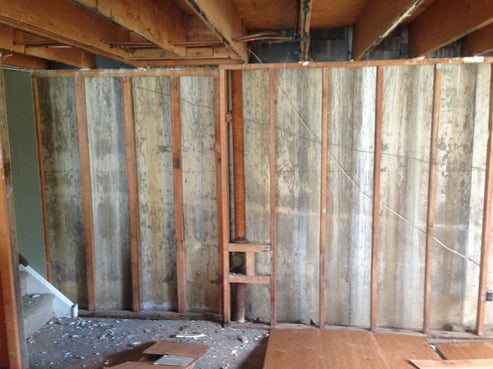
You bought a house from a flipper or bought a newly remodeled home.
The real estate market has been hot with bank properties that flippers buy and sell. The positive to these properties is a buyer can purchase a home that has been newly remodeled without the headache of living through a remodel. The bad, is mold remediation costs are not typically factored into these remodels.
The hard part of any flip is finding the property to flip, so flippers typically will not have inspections performed, leading to overlooked issues, mold being a big one. We have found a high incidence of mold in flipped homes. Flippers seem unconcerned about mold, I say this si we rarely do mold inspections for them, but will do tank sweeps for flippers so they do have some concerns.
Many flippers cover over mold-impacted surfaces. It is most commonly found in crawl spaces and basements when they are remodeled. When a basement is finished, we always recommend air sampling. Our inspections typically find mold growth through air sampling. In short, if you are buying a home that fits this scenario, have an inspection with non-viable air testing performed. Why nonviable?  Because non-viable analysis looks for total concentration regardless of if the spore would grow. This is because dead spores can be an irritant as much as spores that will grow.
Because non-viable analysis looks for total concentration regardless of if the spore would grow. This is because dead spores can be an irritant as much as spores that will grow.
Currently, there are no regulatory limits or medical consensus for threshold-levels of indoor airborne fungi. The industry guidelines recommend that since fungi are normally present in the outdoor environment, acceptable indoor levels (air) are determined by comparison to the outside samples. Inside air, samples should have lower or comparable levels to the outdoors and the genus/species should be similar to that of the outdoors. In both air samples and tape samples, certain “marker” species can indicate interior water damage (as opposed to an outdoor mold) and subsequent microbial amplification. More information about mold testing can be found at How-to-interpret-mold-test-results
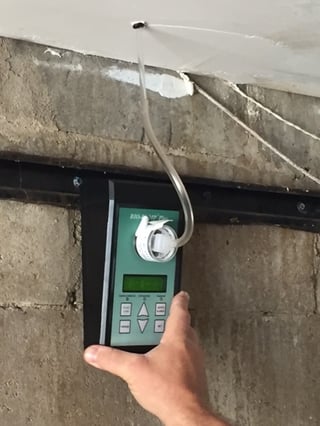
Health Issues Relating to Mold?
Do you have a compliant room? An area in the home or office where there are odors? Do you not feel good in certain rooms? You MAY, have mold, inspection with testing would be prudent.
Mold Cleanup, Removal & Remediation Services
What happens if you find mold, how do you clean it up?
If you have mold, you should determine the cause of the growth, in short where there is mold there is water, moisture or condensation issue. If you don't fix the cause, mold can come back. It also is comforting to know that you addressed the cause. many firms are more interested in remediating the mold not the source. At Curren Environmental will identify the mold and the source of the moisture problem and formulate a remediation plan. The industry protocol is to follow Asbestos Remediation guidelines when you remediate mold. They include the following:
Mold Worker safety
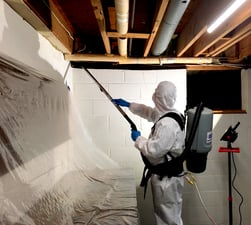
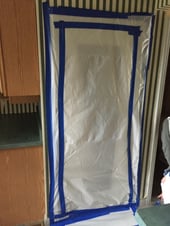
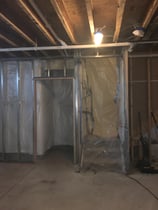
-
Containment of the affected area to avoid contaminating other areas with mold spores.
-
Install and operate negative air machines (commercial grade air filters) and HEPA filters to clean the air of mold spores and other particles during work activities.
-
Remove impacted building materials that cannot be cleaned.
-
Hepa vacuum surfaces
-
Certain materials can be treated with antimicrobial cleaners (no bleach!).
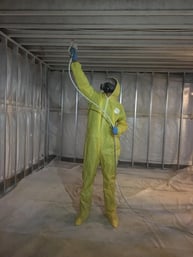
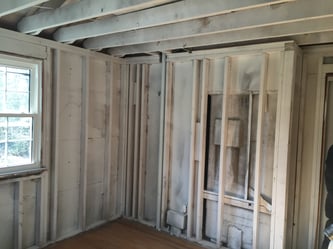
Apply sealants on the remaining organic surfaces. These coatings are fungistatic so they resist mold growth on dry surfaces, seal wood to prevent moisture penetration, and the smooth finish minimizes dirt buildup.
Mold Before: Mold After:


Mold remediation is a multi-step process and for all intensive purposes is not a DIY mold repair. Curren Environmental follows industry mold guidelines for safely removing mold. We are serious about the health of our clients. We know from experience that when a homeowner attempts to remove the mold themselves, or has an untrained person do the work, the contamination often spreads, and the spores become airborne.
If you suspect mold, call Curren Environmental, Inc.
1-888-301-1050 for a Professional Consultation
We have over 20 years of experience serving New Jersey, Pennsylvania and Delaware.












 Because non-viable analysis looks for total concentration regardless of if the spore would grow. This is because dead spores can be an irritant as much as spores that will grow.
Because non-viable analysis looks for total concentration regardless of if the spore would grow. This is because dead spores can be an irritant as much as spores that will grow.







